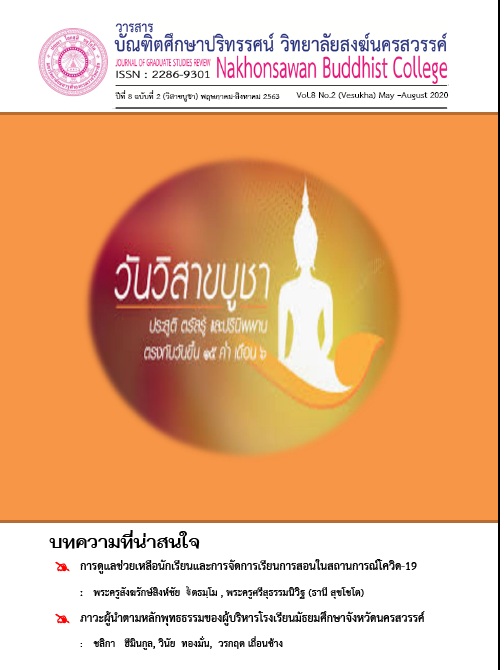แนวทางการใช้นวัตกรรมการบริหารงานวิชาการของผู้บริหารสถานศึกษา ตามหลักอิทธิบาท 4
Main Article Content
บทคัดย่อ
การวิจัยครั้งนี้มีวัตถุประสงค์ 1) เพื่อศึกษาสภาพการใช้นวัตกรรมการบริหารงานวิชาการของผู้บริหารโรงเรียนมัธยมศึกษา สหวิทยาเขตขุนสรรค์ จังหวัดชัยนาท 2) เพื่อหาแนวทางการใช้นวัตกรรมการบริหารงานวิชาการที่เหมาะสมของผู้บริหารสถานศึกษาตามหลักอิทธิบาท 4 โรงเรียนมัธยมศึกษา สหวิทยาเขตขุนสรรค์ จังหวัดชัยนาท โดยศึกษากับกลุ่มตัวอย่างได้แก่ครู จำนวน 153 คน เครื่องมือที่ใช้ได้แก่แบบสอบถาม และเก็บข้อมูลจากผู้จากผู้เชี่ยวชาญ มีค่าความเชื่อมั่น 0.978 สถิตที่ใช้วิเคราะห์ได้แก่ ค่าความถี่ ร้อยละ ค่าเฉลี่ย และส่วนเบี่ยงเบนมาตรฐาน
ผลการวิจัยพบว่า
- สภาพการใช้นวัตกรรมการบริหารงานวิชาการของผู้บริหารสถานศึกษา 3 ด้าน คือ ด้านที่ 1 สภาพการนำนวัตกรรมการบริหารงานวิชาการมาใช้ในสถานศึกษา สูงสุด 3 ลำดับได้แก่การบริหารตามแนว Tip Co, การบริหารแบบวงจรเดมิ่ง, PDCA และการบริหารโดยการใช้ภาคีเครือข่าย ด้านที่ 2 ความพึงพอใจในการใช้นวัตกรรมการบริหารงานวิชาการในสถานศึกษาสูงสุด 3 ลำดับแรกได้แก่ การบริหารตามแบบ CIPP Model ของสตัฟเฟิล,การบริหารแบบพัฒนาคุณภาพศึกษาทางไกลผ่านเทคโนโลยีสารสนเทศ และการบริหารแบบเครือข่ายครู 3) ความเหมาะสมในการใช้นวัตกรรมการบริหารงานวิชาการการสูงสุด 3 ลำดับแรก ได้แก่การบริหารแบบโครงการ, การบริหารแบบระบบสำนักงานอัตโนมัติ , การบริหารโดยใช้โรงเรียนเป็นฐาน
- แนวทางในการใช้นวัตกรรมการบริหารงานวิชาการของผู้บริหารสถานศึกษาตามหลักอิทธิบาท 4 ได้แก่ นวัตกรรมการบริหารตามแนว Tip Co, การบริหารตามแบบ CIPP Model ของสตัฟเฟิล และการบริหารแบบโครงการ สรุปได้ดังนี้ ฉันทะ (Plan- P) สถานศึกษา ศึกษา วิเคราะห์ ถึงผลได้ผลเสียจากการ SWOT มีการกำหนดวิสัยทัศน์ กลยุทธ์การวางแผนทำโครงการเพื่อพัฒนางานวิชาการ ร่วมคิด ร่วมทำ ให้ความเคารพซึ่งกันและกันทำงานเป็นทีมอย่างเต็มกำลังความสามารถ วิริยะ (Do -D) สถานศึกษามีการปฏิบัติตามแผนอย่างเป็นระบบ โดยการรับฟังความคิดเห็นของคณะทำงานครูทุกคนร่วมกันทำอย่างสมัครใจ เพื่อให้เกิดประสิทธิภาพสูงสุดในองค์กร จิตตะ (Check-C) ปฏิบัติเสร็จสิ้นโครงการตามแผนมีการแต่งตั้งคณะกรรมการนิเทศ และประเมินผล อย่างเป็นระบบเปิดโอกาสให้ผู้มีส่วนได้ส่วนเสียได้เข้ามามีส่วนร่วมในการนิเทศและประเมินผลให้เป็นอันหนึ่งอันเดียวกัน วิมังสา (Action-A) : สถานศึกษาร่วมกันภาคภูมิใจในผลของการปฏิบัติงาน และประชุมเพื่อปรับปรุงแก้ไขผลการประเมินที่อยู่ในระปรับปรุงเพื่อให้เกิดประโยชน์สูงสุดกับผู้เรียนและมีการพัฒนางานวิชาการอย่างต่อเนื่องและยั่งยืนต่อไป
Article Details
ประเภทบทความ
บทความวิจัย (Research Articles)


